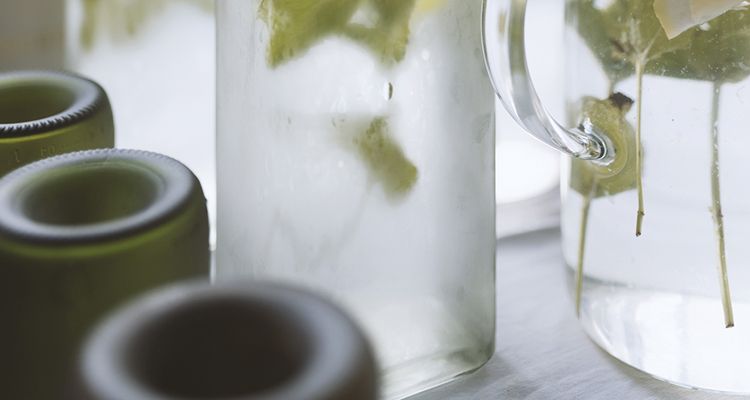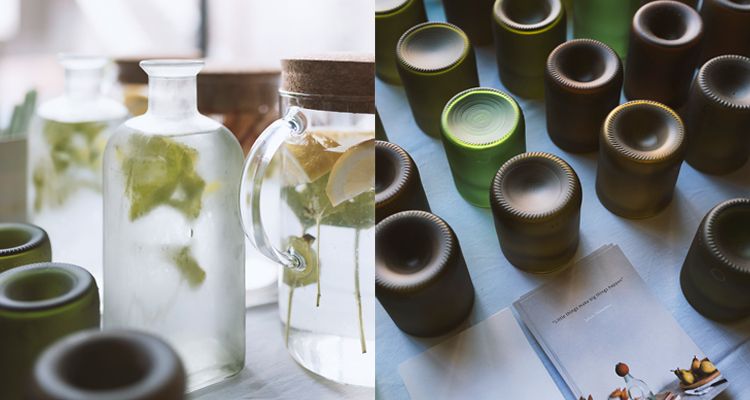The last July 5th I had the opportunity to support a project that I believe it’s fascinating and groundbreaking: I’m talking about The Imperfect Beauty, an event created by Elsa Yranzo and Marina Senabre, that has celebrated its 3rd edition and wants to be a meeting point to think about the beauty standards that we have imposed by our consumer system. This third edition was focused on what today is practically the second skin that wraps our food, and not only that. We are talking, of course, about plastic, a material that nowadays seems basic and it is almost indestructible. The event took place in Montoya Passage, Barcelona, and consisted in an photo exhibition called “Organic vs. Plastic Degradation”. There also was a round table where different professionals discussed about the excessive use of plastic. In the event, it was also possible to enjoy a meal with “imperfect products”. To contribute in a small way, I lended some of my Musk glasses for the event buffet.
I want to point out that I’m not talking about the typical event in which you point the finger to the problem, feel yourself guilty for a moment and it’s over. The Imperfect Beauty offers the great value of connecting with your inner self and makes you look at things with different eyes.
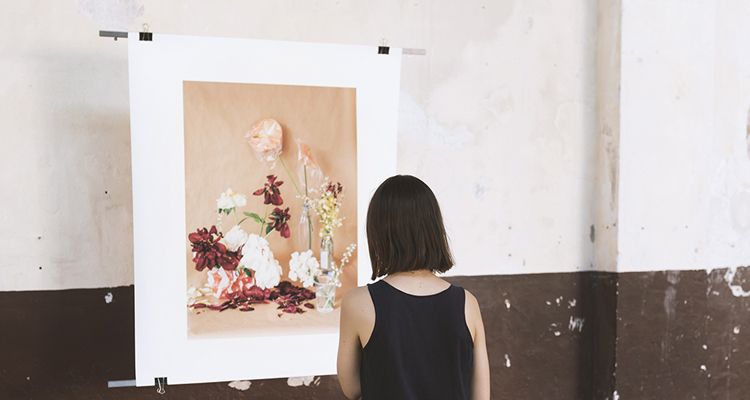
I believe it’s necessary not to demonize the plastic itself, but to consider about the unnecessary use that we are doing of it. Plastic, in its beginnings, was born with a sustainable purpose. Maybe you don’t know, but plastic was invented because there was a need to find a material to replace the ivory from the elephant tusks that was used to make billiard balls, because the production of these balls was putting in danger the female elephant population.
Interview with Elsa Yranzo, cofounder of The Imperfect Beauty
Sustainability is one of the key aspects that Elsa and Marina try to approach in their events. Elsa Yranzo, cofounder of The Imperfect Beauty, is a gastronomic events designer and uses gastronomy as a channel to communicate concepts, ideas and emotions to create sensorial experiences. Today she has accepted the challenge to respond to some questions to tell us a bit more about this third edition of The Imperfect Beauty.

-Elsa, Marilyn Monroe said: “Imperfection is beauty, madness is genius and it’s better to be absolutely ridiculous than absolutely boring.” Which is the curiosity that supposed the origins of The Imperfect Beauty?
-Absolutely agree with Marylin! Imperfection is authenticity!
The imperfect beauty was born in 2016 with the purpose of explaining, reivindicating and reconsider consumer habits as the food waste through artistic actions.
The imperfect beauty wants also to create debate around the beauty standards, that are not only applied to food, but everything that sorrounds us. Wants to make us think if there is beauty or not in the supposed imperfections.
-The Imperfect Beauty celebrates its third edition. Can you summarize a little bit how this project has developed in the three editions?

-The first edition was focused on the indecent amount of food that is rejected for aesthetic reasons: there was a colloquium and afterwards a dinner was served with fruits and vegetables that were considered “ugly” and were about to be thrown out.
We vindicate an artificial beauty as the natural one, when actually it isn’t: not all the tomatoes are alike and neither the carrots are straight nor the clementines have the same diameter.
In the second edition, we digged deeply into the discussion about this “false” beauty standards using the sking as a common thread. It consisted in a photo exhibition of our “im-perfect” skins (scars, freckles, wrinkles…) compared with the imperfections found in fruits and vegetables. The images were accompanied by different gastronomic installation, as a big table with edible skins.
This third edition had a more educative format, because it consisted in a exhibition and also a round table. This time, we discussed about the second skin: the plastic.
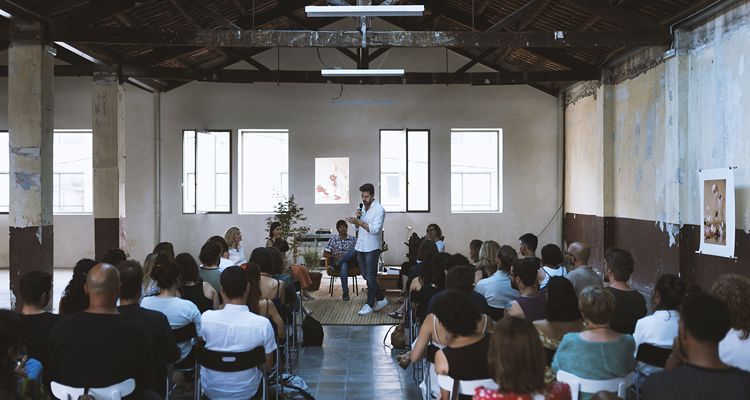
-This last edition, Marina and you wanted to discuss the denial of natural process when talking about this plastic that covers everything. What do you mean when you say that we are plastifying the beauty?
When we talk about the plastification of beauty, we condemn the excessive use of plastic, this second skin, this artificial element that we add ourselves with no apparent purpose. It is really a monster that surrounds everything and destroys everything.
We want to point out the contradiction between the fact of unprotecting vegetables of their natural skin and then asphyxiating them with a new indestructible and processed material.
We want also to denounce the dictatorship of perfection, as there seems to be this intention of replacing everything that is perishable with longlasting items that resist over time, rejecting the processes of nature and the beauty of the process, not being conscient that this second skin will end chocking the Earth.
-We are used to see beauty as something momentary and superficial. What is the role of beauty when we talk about sustainable conscience and respect for the environment?
-In my opinion, beauty resides in imperfection. the imperfection is natural, is real and, therefore, is authentic. Every imperfection is a feature that makes us unique and that’s the reason why there is beauty in it.
For me, this sustainable conscience would be respecting the natural processes, the passage of time, identifying the natural and good with the imperfection. For example, when buying fruits and vegetables, I’m always the one who carries with me the monstrous carrots, the aubergines with nose and the oranges without makeup.
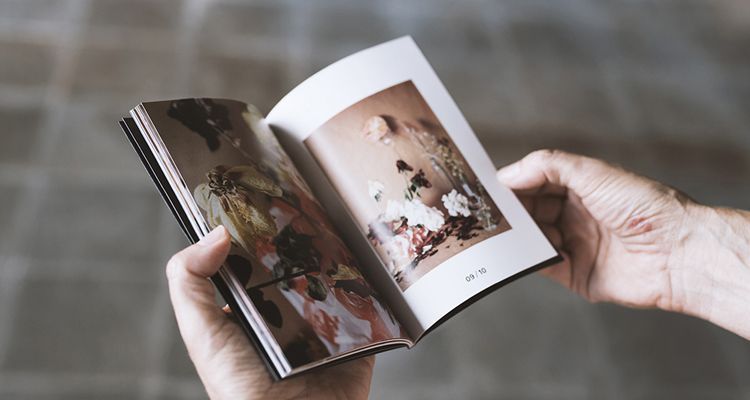
-Regarding food, we are seeing more and more, mainly in supermarkets, a superfluous use of wraps and plastic covers. Don’t you think that, as consumers, we have re-educate ourselves and find different alternatives?
-Totally, the key resides in eating and consuming with conscience! We not only have to eat with our eyes, but with every sense, with the heart, with the soul and with the mind!
As consumers, I encourage you to buy bulk and eat ugly fruits and vegetables to avoid the plastic. It would be more tasty, better and more sustainable!
A year ago, I wrote a post about Wabi Sabi philosophy, which elevates and gives importance to the imperfections and the simplicity of the objects and live beings that we can find in nature: it invites us to accept and appreciate the things as they are in its natural state. Events as the Imperfect Beauty with Elsa and Marina help us one more time to reconnect with a more realist and authentic dimension with what surrounds us and make us think about our role as responsible consumers. It is not as much as recycling as thinking and buying wisely to avoid producing plastic waste.
To end this post, I invite you to do a little thinking: of all the food you buy, how many could you buy without using plastic containers? Beans, rice, fruits, vegetables, cold cuts, pasta, chocolate, milk… The list is bigger than you can believe and there are lots of alternatives available if you want to investigate. You’ll be surprised for sure!

